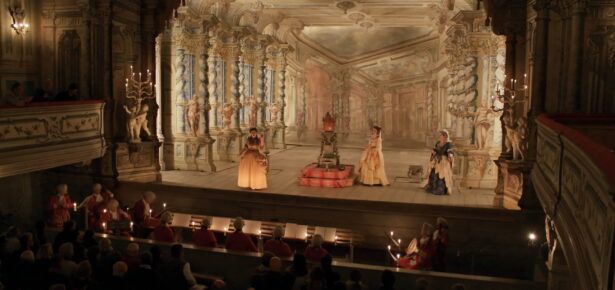
When I lived in Germany, I was spoilt by choice so far as opera was concerned. I was in an area that had three large theatres separated by two rivers and all very close to one another. I certainly wasn’t alone in having such great access to music and theatre, as Germany has more theatres than any other European country. This fact is a legacy of the musical and theatrical culture fostered by the territories that once belonged to the Holy Roman Empire: the subject of my book.
Music Theatre and the Holy Roman Empire examines the years leading up to 1806, when the Empire was dissolved after centuries of framing the cooperation—and power struggles—of many individual Central European states before the emergence of today’s nations. It might seem as though there is very little new to be said about the ‘Classical era’ in late eighteenth- and early nineteenth-century Western music. After all, few musical periods have given rise to so much scholarship. But this era has also been one of the most myopically studied, with a historic focus on the instrumental music of Haydn, Mozart, and young Beethoven above all else, especially as it relates to the Austrian capital of Vienna. Recent work has distanced the history of the ‘Classical era’ from the dominance of this genre, these figures, and this city, of course. Yet the wider, shared story linking German-language theatres and their musical repertoires across Central Europe at this time has evaded scholarly attention—until now.
As the first cultural history of German music theatre in the late Holy Roman Empire, my book is a fresh account of these years of music history, one that goes beyond a select group of composers, works, urban centres, and national discourses to offer a radically new vista onto the interconnected world of music theatre. I do so by mapping hundreds of German theatres active across Europe and the Empire; reconstructing their shared musical repertoire; tracing the development of melodrama, a new—and odd—genre staged by nearly every troupe; and exploring how the Empire itself was (re)imagined on Central European stages in its waning years.
Finding the evidence to do so was not particularly difficult. Period journals consistently recorded details of performances and other relevant news from theatres across this space. What was difficult, however, was making sense of the volume of this data (there were some 16,000 references to repertoire and composers in one journal alone). I turned to digital tools and quantitative methods to aid my analysis in the earlier chapters of the book. In the latter parts, I employed these distant readings to guide my close reading of source material, including hundreds of letters written by theatre professionals and enthusiasts that I sifted through in archives across Germany.
Through these sources and approaches, a long unnoticed networked realm of music theatre re-emerges. In many ways, this world would be quite familiar to theatregoers today. Just as twenty-first-century audiences can experience their favourite pieces time after time in theatres around the world, so too could audiences in an early modern polity too diverse for a single cultural or political capital at the turn of the nineteenth century owing to an entangled world of music theatre connected by mobility, communication, and information.
Performance of Antonio Caldara’s opera “Il natale d’Augusto” in the Baroque Castle Theatre in Český Krumlov, performed by the Baroque ensemble Hof-Musici, conducted by Ondřej Mace.
Photo by VitVit under Creative Commons Attribution-Share Alike 4.0 International license courtesy of Wikimedia Commons.
Latest Comments
Have your say!